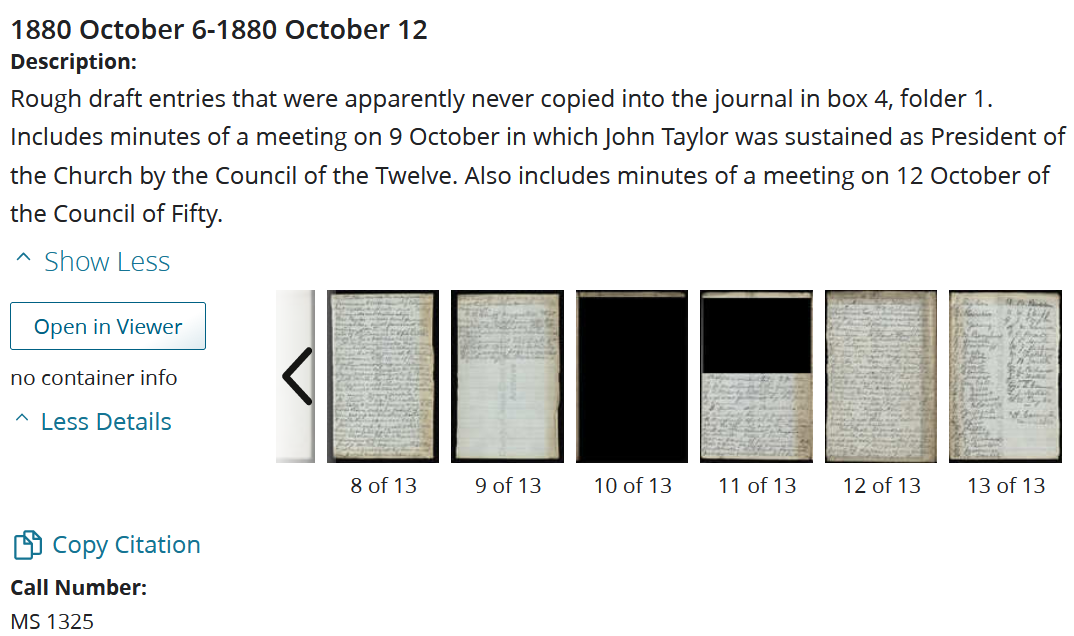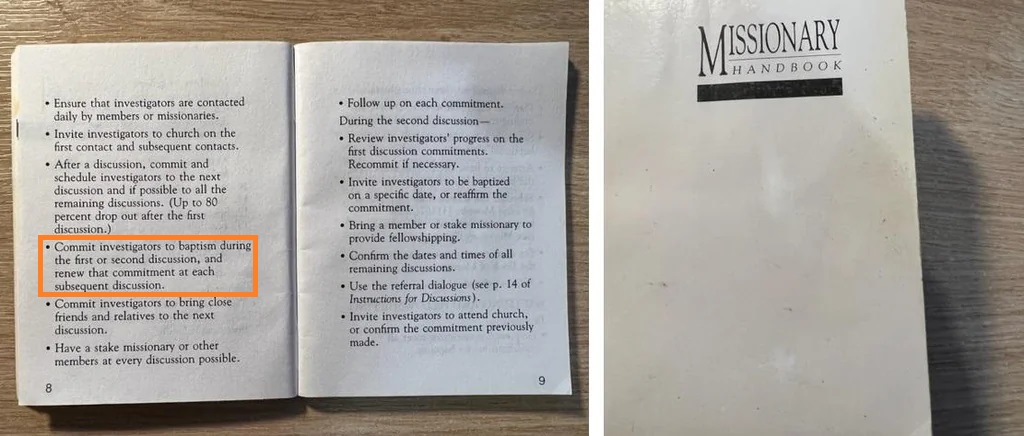🧼 Whitewashing History¶
Estimated time to read: 9 minutes
There has been no attempt on the part, in any way, of the church leaders trying to hide anything from anybody.
We're as transparent as we know how to be.
— Face to Face with Elder Oaks and Elder Ballard, 46:37 timestamp (Archive link)
Fun fact: if you look closely, this video is unlisted, meaning it "won’t appear in the Videos tab of your channel homepage. They won't show up in YouTube's search results unless someone adds your unlisted video to a public playlist."
You can't make this up.
First Vision concealment¶
While serving as church historian, Joseph F. Smith physically removed pages from the founding prophet Joseph Smith's journal outlining his first-hand account of the First Vision. This account, recorded in JS Jr's own handwriting, conflicts with the canonized, standard version of the First Vision, and sure would be a bad look if someone were to encounter it. Better vandalize the historical record and slice out the pages as a preventative measure. No way this could backfire and cause problems later, nope
I've got an entire page of notes concerning the First Vision, and I'll go into more detail on concealing the First Vision. For this excerpt, I'll be satisfied with that superficial overview, along with some links for further reading:
Descriptions:
- The Strange Hidden First Vision Account of 1832; WasMormon.org
- LDS Discussions
Primary Source Documents, with cellophane tape visible in the scanned documents:
Under the "Source Note" for the JSPP 1832 document:
Also, the initial three leaves containing the history were excised from the volume. The eight inscribed leaves in the back of the volume may have been cut out at the same time.
In the footnote of that source note:
These eight leaves have not been located.
Manuscript evidence suggests that these excisions took place in the mid-twentieth century. A tear on the third leaf, which evidently occurred during its excision, was probably mended at the time. This tear was mended with clear cellophane tape, which was invented in 1930
General Conference¶
Before 1971¶
LDS website only shows general conferences back to 1971. Why?
Go look at the earliest listed entry:
My dear brothers and sisters:
We welcome you, and all those who hear and see on radio and television. We welcome you to the sessions of the 141st Annual General Conference of The Church of Jesus Christ of Latter-day Saints.
— Out of the Darkness, Joseph Fielding Smith, President of the Church, General Conference 1971 April
141st? Where are the other 140?
You've got to do some digging if you want to access the words of God's prophets, divinely appointed to lead and guide this dispensation. If God had wanted to tell His beloved children something between Joseph Smith's passing and the beginning of the Unix Epoch, you'll need to find them in the Church's history catalog (edit: lol it isn't there anymore). No, it isn't indexed. We're dedicating all of those indexing resources to genealogy. You want to know what God said? Tough, we're going to tell you what your 6th-generation grandpappy's dog's name was instead. Hope that helps.
1981¶
Straight up, they removed an entire paragraph from the searchable text, and I'll prove it.
Here's a link to the talk, with a video recording. Play it and read along. The quote below begins at 6:39. Note that the transcript omits the bolded paragraph.
. . . They will get a great desire to raise a family of their own when they see what a great blessing they were to you.
If children have a happy family experience, they will not want to be homosexuals, which I am sure is an acquired addiction, just as drugs, alcohol, and pornography are. The promoters of homosexuality say they were born that way, but I do not believe this is true. There are no female spirits trapped in male bodies and vice versa. He who made them made them male and female. Every form of homosexuality is sin, said the living prophet Spencer W. Kimball.
Also, I seriously doubt that you will ever turn your own heart more to your own fathers than by writing your family history. . . .
— Turning the Hearts, Elder Hartman Rector, Jr. First Quorum of the Seventy, General Conference 1981 April
Now why would they want to remove that?
2012¶
A few question their faith when they find a statement made by a Church leader decades ago that seems incongruent with our doctrine. There is an important principle that governs the doctrine of the Church. The doctrine is taught by all 15 members of the First Presidency and Quorum of the Twelve. It is not hidden in an obscure paragraph of one talk. True principles are taught frequently and by many. Our doctrine is not difficult to find.
— Trial of Your Faith, Elder Neil L. Andersen, of the Quorum of the Twelve Apostles; General Conference October 2012
Compare this to 2007...
Much misunderstanding about The Church of Jesus Christ of Latter-day Saints revolves around its doctrine. The news media is increasingly asking what distinguishes the Church from other faiths, and reporters like to contrast one set of beliefs with another.
The Church welcomes inquisitiveness, but the challenge of understanding Mormon doctrine is not merely a matter of accessing the abundant information available. Rather, it is a matter of how this information is approached and examined.
The doctrinal tenets of any religion are best understood within a broad context, and thoughtful analysis is required to understand them. News reporters pressed by daily deadlines often find that problematic.
— Approaching Mormon Doctrine, Mormon News Room, 4 May 2007
Then compare to FAIR.
Official doctrine is usually easy to determine. When FAIR is aware of an official doctrine or position statement, we attempt to provide it, with references so interested readers can check the sources for themselves. In all other cases, we try to describe the spectrum of LDS thought on a given issue, while noting that more than one point of view is held by faithful members of the Church.
— Introduction to apologetics, FAIR, around 2023 (probably)
Council of Fifty meeting minutes¶

— Joseph F. Smith papers, 1854-1918; Autobiographical writings, 1856-1909; Journals and diaries; 1880 October 6-1880 October 12; Church History Library, https://catalog.churchofjesuschrist.org/record/120ef45b-fb68-4ea8-bec4-0497c83f4f4d/339275a3-89b3-4f2e-bb01-03dd52e9cdd1?view=browse (accessed: August 2, 2024)
See it for yourself: - Page 10 - Page 11
Bro they literally 1984'd this record. Just as Jesus would have wanted 😇
Baptism Invitation¶
Some missionaries have felt pressure to invite people to be baptized during the first lesson or even the first contact. “These missionaries have felt that inviting people to be baptized the very first time they meet them demonstrated the missionaries’ faith and supports their thinking that inviting people to be baptized early is what is expected,” he said. “Other missionaries have felt that an invitation to be baptized early allowed them to promptly separate the wheat from the tares. In this case, some see the baptismal invitation as a sifting tool.”
Church leaders don’t know where these practices began, but “it was never our intention to invite people to be baptized before they had learned something about the gospel, felt the Holy Ghost, and had been properly prepared to accept a lifelong commitment to follow Jesus Christ,” said President Ballard. “Our retention rates will dramatically increase when people desire to be baptized because of the spiritual experiences they are having rather than feeling pressured into being baptized by our missionaries.”
— President Ballard said missionaries shouldn't invite people to be baptized without feeling the Spirit. Here's why, Church News
I truly find this upsetting. Using the baptism invitation early on to "separate the wheat from the tares" is literally what they told me to do while I was in the MTC. I am not exaggerating or embellishing this. They told me that. I remember that lesson so distinctly because the instructors used an analogy of triage to prioritize who to focus on. ... More specifically, I remember that lesson because I made a fool of myself by answering that I knew what triage was, when in reality, I did not. That lesson stuck with me for the wrong reason, but I remember very clearly that I was explicitly told to do exactly this for that exact reason.
He's either lying through his teeth or is really far gone with dementia. He's been in charge of the missionary program for years. There's no way he doesn't know about these materials.
- Preach my Gospel, Lesson 1: "As directed by the Spirit, during this or any other lesson, do not hesitate to invite people to be baptized and confirmed."
- Old Missionary Lessons, Discussion 1, Principle 6: "Invite: As prompted by the Spirit, you could now invite the investigators to be baptized."
- Old Missionary Lessons, Discussion 2: "We will be holding a baptismal service on (date). Will you prepare yourself to be baptized on that date?"
- Missionary Training Manual, "Check Your Progress":
-
- I invite my investigators to be baptized in the first lesson.
-
- I invite my investigators to be baptized with a specific date no later than the second lesson.
-
Here's a photo of an older version of the missionary handbook, which I was to carry on my person at all times:

Golly gee, I simply can't imagine where those practices began